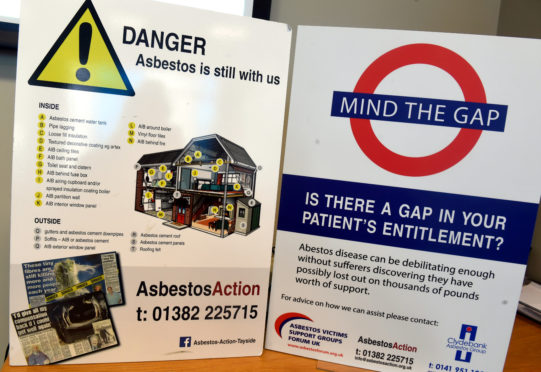Those impacted by asbestos-related health problems were given expert advice at a major event in Dundee.
The Asbestos Action AGM, held at V&A Dundee, highlighted issues affecting sufferers and what medical, legal and political agents are doing to help improve healthcare and access to justice.
Hundreds of thousands of people were exposed to asbestos in some capacity as a result of its extensive use in domestic, commercial and industrial products throughout the 20th century.
Airborne asbestos fibres, which are easily inhaled, have been shown to cause cancer and past exposure is estimated to kill around 4,000 people per year in the UK and more than 100,000 worldwide.
Asbestos Action is a Scottish charity set up to assist sufferers of asbestos-related diseases in Scotland.
Addressing questions from the 100-strong audience, John Fearn, manager at Asbestos Action, said one of the biggest challenges is holding to account those responsible.
He said: “Looking back to when asbestos was being used, I do think there was a bit of short-term thinking going on.
“They were worried about a girder falling on someone’s head but not so much about something potentially happening in, say, 40 years.
“It is frustrating that even now, big businesses are looking for loopholes while people are suffering.”
There is no safe type of asbestos and no safe level of exposure, according to Asbestos Action, who say nearly all those with exposure history are at risk of serious respiratory health complications.
In 1985, blue (crocidolite) and brown (amosite) asbestos was banned in UK construction while nearly 15 years later, white (chrysotile) asbestos was also banned.
Labour MSP for Mid Scotland and Fife Claire Baker said that one of the issues is how companies have reacted since the flaws of asbestos were uncovered.
She said: “It was promoted as a marvellous substance — people didn’t know at the time.
“Assessing it now, it is about when it was known. How did companies and people react to the realisation it was harmful and how quickly?
“Not all countries have the same protections we have here.
“We have the Health and Safety Executive (UK government agency) who will carry out inspections if information comes to light.”
The AGM also heard from Phillip Short, a respiratory consultant at Ninewells Hospital, who explained the effects asbestos can have and said in some countries, such as those in South East Asia, exposure continues to this day.










